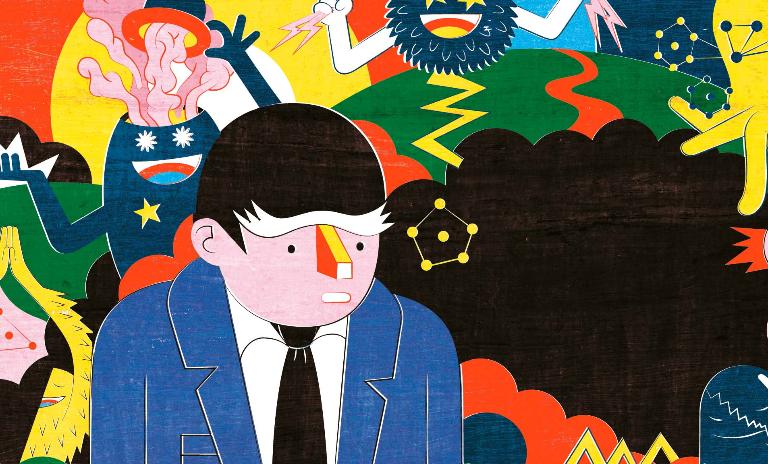Making life better
![{[downloads[language].preview]}](https://www.rolandberger.com/publications/publication_image/ta_35_001_en_cover_download_preview.jpg)
Investing in health is good for individuals and businesses. Think:Act Magazine shows how organizations can help in making life better.


by Bennett Voyles
illustrations by Roman Klonek
It might feel that the worst of the pandemic is over, but there are sure to be aftershocks. How can you ensure your business thrives despite the gloomy outlook? Simple. Use our road map, complete with spirit guides and based on the experience of those who have weathered catastrophes.
One of the biggest long-term impacts of any crisis is that it changes how people think. Those who lived through the Great Depression, for example, were often extremely frugal for the rest of their lives. More recently, people who lived through the collapse of the Eastern Bloc were changed too, in ways that made it hard for them to adapt to their new economic reality. Kristalina Georgieva, the Bulgarian economist who is now managing director of the International Monetary Fund, has said such long-term scarring may be one of the biggest legacies of the current pandemic.
Now scholars are discovering that it's not only consumers and ordinary workers we have to worry about. Many managers whose careers have been affected by crises, such as executives who went through the dotcom meltdown of 2000, the financial crisis of 2008 and the recession that followed, suffered similar scarring from these tough years. But what can scarring like this do to you, as a senior executive? Or, more pertinently, how can it lead you to miss important opportunities and what can you do to fight it?
1.18: How many years older CEOs of companies particularly hard-hit by the 2008 financial crisis looked than their peers five years after the crisis.
One recent analysis by Marius Guenzel, assistant professor of finance at the Wharton School of the University of Pennsylvania, and three co-authors, found that CEOs in industries hard-hit by the financial crisis aged more quickly than their peers who ran firms in calmer sectors. Using machine learning programs trained to estimate a person's age from a photograph, Guenzel and his associates found that when they compared a time-series of pictures of 1,000 CEOs of companies on the 2006 Fortune 500 list – categorizing them by whether they worked in industries affected by the downturn and/or in industries that were not – five years later, those who had been at the helm of hard-hit companies during the crisis appeared 1.18 years older than their less-stressed peers. And that's just average: Jim Donald, CEO of Starbucks from 2005 until January 2008, when shares tanked 40% and he was dismissed, visually aged an extra 2.5 years.
Of course, an effect on physical appearance isn't the worst that stress can do. Guenzel and his co-authors also found that job stress can take a heavy toll on one's life span: Over a 40-year period, CEOs of companies headquartered in US states that had liberal merger and acquisition rules died on average two years earlier than their peers. Older research about CEOs who went through depressions and other economic crises shows that they tended "to be more cautious because they had that scarring lifetime event when they were young. They know that times can be bad and they … have built that into their wiring," Guenzel says.
There are worse things than caution, of course, but business history suggests that it isn't necessarily the best lesson to draw from a downturn. In fact, an outsized number of exceptionally successful businesses launched in tough times – including Disney (1929), Hewlett-Packard (1939), FedEx (1970), Dell (1984), Airbnb (2008) and Uber (2009).
The worry lines may be unavoidable, but the organizational damage of scarring can be dodged if you take some brave steps right now. Wharton's Guenzel, Stanford strategist Robert A. Burgelman, and other scholars have five key suggestions for what you should be doing right now:
"If you don't continue to innovate during hard times, you will not be able to take advantage of the opportunities when the new, better times come along."
Everyone knows Moore's law – that the number of transistors in a dense integrated circuit doubles about every two years – but Burgelman, professor of management at the Stanford Graduate School of Business, says most people aren't familiar with what he thinks of as Moore's Second Law: Innovate during hard times. Burgelman, who taught innovation at Stanford with former Intel CEO Andrew Grove for 24 years, says Gordon Moore, the circuit company co-founder, often talked about the importance of innovating through downturns. "'During hard times, you must continue to innovate,'" Burgelman recalls Moore saying. "'Because if you don’t continue to innovate during hard times, you will not be able to take advantage of the opportunities when the new, better times come along, because you can’t get well on your old products.'"
The Covid-19 pandemic will be no exception, Burgelman predicts, ticking off the pharmaceutical industry, Zoom, Microsoft and Amazon as innovators during the present downturn who are likely to continue to do well as things pick up.
But you can only do this if you have built what Burgelman calls an "anti-fragile adaptive capacity" that is, if you have organized your firm in such a way that if an investment works out, it will lead to a very big upside, but if it doesn’t, the downside will be limited, enabling you to continue adapting however the market develops.
46%: The gain in HP's share price in the one-year period following the company's split. Its new spinoff, HPE, gained 82.9%.
Source: NASDAQ
Sometimes, Burgelman says, maintaining this level of flexibility may mean making a big break with the past, as Hewlett-Packard did in 2015, when it split into Hewlett Packard Enterprise (HPE) and HP. "With the two businesses together, even an upside on what they thought – even a positive change in the environment – would not lead to a very large upside, but if it were in the other direction, it would provide a potentially great downside," Burgelman explains. "Splitting the companies was better because now each company can take better care of its own evolving strategic situation … each entity now is better adapted to that ecosystem, than if they have to, at the corporate level, try to balance the adaptive demands of these two very different ecosystems." A number of large companies are also thinking this way now, according to Burgelman. General Electric, DowDuPont and United Technologies have all followed the same path in recent years.
Another key mental challenge faced by executives in a crisis is learning to live in the present. In another study, Guenzel and several co-authors demonstrated through mergers and acquisitions data that CEOs often fall prey to the sunk cost fallacy. Guenzel demonstrates that companies that have just made an acquisition with a fixed ratio of stock are actually 8% or 9% less likely to eventually divest the acquisition if the value of the acquirer's stock rises substantially before the deal closes – exactly the opposite of what finance theory says they should, as the move in the stock price makes the original cost basis of the deal more expensive.
In the case of this pandemic, European Central Bank economists have speculated that physical capital is likely to depreciate at an accelerated rate as the recovery gets underway. A number of economists have warned that what earlier seemed like rock-solid investments in downtown office space and high street retail, for instance, may not be if many people continue to work and shop online in the post-Covid era.
80%: The percentage of CEOs polled by the WEF in 2020 who now intend to fast-track plans to digitalize their work processes and increase remote opportunities.
European Central Bank economists have noted that although the Covid-19 pandemic delivered an unparalleled shock to the international economy, it's still unclear how much more damage the pandemic may yet wreak in the months and years to come. In the past, more localized epidemics have shown a tendency to negatively influence output for a shorter period of time than a war or a financial crisis, for example.
ECB economists have argued that although Covid-19's impact may be negative in the short run, particularly in labor-intensive sectors, such as retail and hospitality, the pressures of social distancing may have accelerated the digital transformation in ways that will boost productivity in the long run. Certainly, many executives have already signaled that they see digitalization as a key part of their game plan: A World Economic Forum (WEF) survey in 2020 found that 80% of the CEOs polled intended to accelerate plans to digitalize their work processes and create new remote opportunities. Whether they use artificial intelligence, cloud computing, the Internet of Things or big data analytics to do it, there are clearly a number of opportunities coupled with a keen interest in development.
And some other technology spillovers from the crisis may prove enormously beneficial as well. In February, for instance, a Yale University team announced that it had developed a blueprint for a malaria vaccine using technology similar to the new mRNA-based technology of most Covid-19 vaccines. If it proves effective, the malaria vaccine could save more than 400,000 lives a year. Eliminating malaria could save at least $12 billion a year in Africa alone and boost the global economy by many times that figure, according to US Centers for Disease Control and Prevention analysts.
Even the outlook for global warming is looking slightly better at the moment. Not only did the lockdowns end up reducing CO₂ emissions, but the US rejoined the Paris Agreement on climate change on the first day of the Biden Administration and the International Renewable Energy Agency sees more blue skies ahead: Renewables are already the cheapest option for new electricity capacity almost everywhere in the world and the cost of renewable production is expected to fall by 50% or more by 2030 over 2019 levels.
$12 billion: How much the African economy could save annually as a result of a malaria vaccine based on the mRNA technology that was first approved for the Covid-19 vaccine.
Finally, Burgelman advises trying to stay open to new possibilities. He emphasizes that every strategic challenge involves deciding how much of a shift you need to make from your induced strategy – pursuing and refining your current business to an autonomous strategy, pursuing a goal that takes you in a different direction. You need to be doing both, but the ratio should change depending on the particular situation – and a downturn, provided you have sufficient reserves, is often a good time to pursue an autonomous project.
This isn’t easy, Burgelman warns. Even in the life of an individual "all these voices in his head are telling him, 'Should I, or should I not?' And of course, that's already complicated, but it gets even more complicated at the level of a company where multiple senior executives will have to have a voice in whether we want to continue with this innovation, with this new business opportunity, or not." You need to be able to tolerate a bit of uncertainty at times, Burgelman says – or as Grove put it in the title of one of their joint articles: Let Chaos Reign, Then Rein In Chaos. Then adding repeatedly, because it will happen more than once.
![{[downloads[language].preview]}](https://www.rolandberger.com/publications/publication_image/ta_35_001_en_cover_download_preview.jpg)
Investing in health is good for individuals and businesses. Think:Act Magazine shows how organizations can help in making life better.


